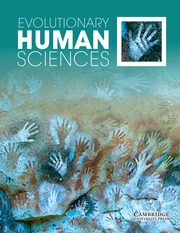No CrossRef data available.
Article contents
Expanding the Causal Menu: An Interventionist Perspective on Explaining Human Behavioral Evolution
Published online by Cambridge University Press: 01 October 2024
Abstract
Theorists of human evolution are interested in understanding major shifts in human behavioral capacities (e.g., the creation of a novel technological industry, such as the Acheulean). This task faces empirical challenges arising both from the complexity of these events and the time-depths involved. However, we also confront issues of a more philosophical nature, such as how to best think about causation and explanation. This article considers such fundamental questions from the perspective of a prominent theory of causation in the philosophy of science literature, namely, the interventionist theory of causation. A signature feature of this framework is its recognition of a family of distinct types of causes. We set out several of these causal notions and show how they can contribute to explaining transitions in human behavioral complexity. We do so, first, in a preliminary way, and then in a more detailed way, taking the origins of behavioral modernity as our extended case study. We conclude by suggesting some ways in which the approach developed here might be elaborated and extended.
- Type
- Research Article
- Information
- Creative Commons
- This is an Open Access article, distributed under the terms of the Creative Commons Attribution-NonCommercial-NoDerivatives licence (http://creativecommons.org/licenses/by-nc-nd/4.0/), which permits non-commercial re-use, distribution, and reproduction in any medium, provided the original work is unaltered and is properly cited. The written permission of Cambridge University Press must be obtained for commercial re-use or in order to create a derivative work.
- Copyright
- Copyright © The Author(s), 2024. Published by Cambridge University Press


